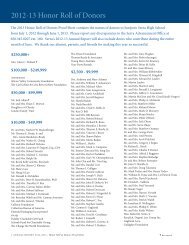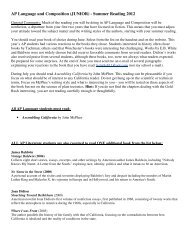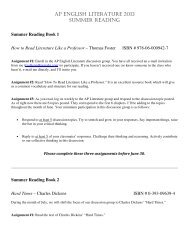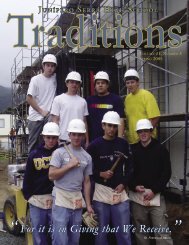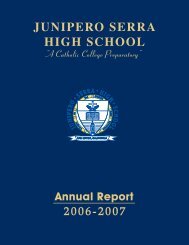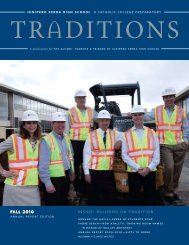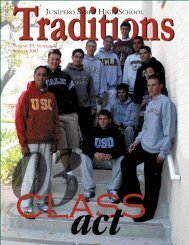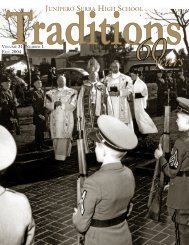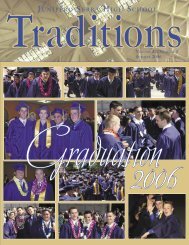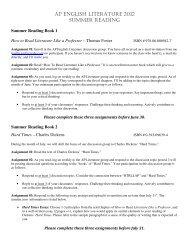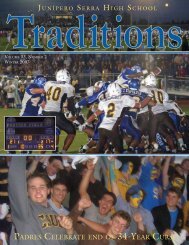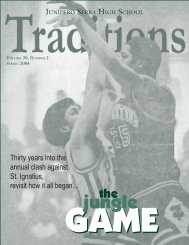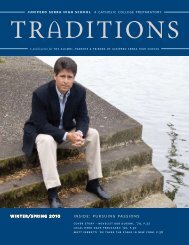AP Language and Composition Summer Reading List
AP Language and Composition Summer Reading List
AP Language and Composition Summer Reading List
- No tags were found...
Create successful ePaper yourself
Turn your PDF publications into a flip-book with our unique Google optimized e-Paper software.
<strong>AP</strong> <strong>Language</strong> <strong>and</strong> <strong>Composition</strong> (JUNIOR) - <strong>Summer</strong> <strong>Reading</strong> 201312General Comments: Much of the reading you will be doing in <strong>AP</strong> <strong>Language</strong> <strong>and</strong> <strong>Composition</strong> will be nonfiction, adeparture from your first two years that have focused on fiction. This means that you must adjust your attitude toward thesubject matter <strong>and</strong> the writing styles of the authors, starting with your summer reading.You should read your book of choice during June. Select from the list on the h<strong>and</strong>out <strong>and</strong> on the website. This year’s<strong>AP</strong> students had various reactions to the books they chose. Students interested in history often chose books by Tuchman; otherssaid that Winchester’s books were interesting but challenging. Works by E.B. White <strong>and</strong> Baldwin were not widely chosen butdid receive favorable comments from several readers. Didion’s works also received praise from several students, although thesebooks, too, were not always what readers expected. Be prepared for some surprises. At the end of June you must send me an e-mail of several paragraphs explaining your reactions to the book that you have read: kstaple611@aol.com (not my school e-mail).During July you should read Assembling California by John McPhee. This reading can be pleasurable if you focus onwhat should be of interest to any California reader. Do not get hung up on the scientific or technical terms. Focus on McPhee’swriting style <strong>and</strong> what is interesting to you – you will be tested on these aspects of the book but not on the science of platetectonics. Hint: If you do not find the chapters dealing with the Gold Rush interesting, you are not reading carefully enough orthoughtfully.All <strong>AP</strong> <strong>Language</strong> students must read:• Assembling California by John McPheeALL <strong>AP</strong> Literature students are also required to read ONE additional book from the list below:James BaldwinVintage Baldwin (2004)Collects eight short stories, essays, excerpts, <strong>and</strong> other writings by American author James Baldwin, including "Nobody KnowsMy Name: A Letter from the South," exploring race, identity, politics <strong>and</strong> what it means to be an American.No Name in the Street (2000)A personal account of the sixties <strong>and</strong> seventies displaying Baldwin's fury <strong>and</strong> despair including the murders of Martin LutherKing <strong>and</strong> Malcolm X, his sojourns in Europe <strong>and</strong> in Hollywood, <strong>and</strong> his return to America's South.Joan DidionSlouching Toward Bethlehem (2008)American novelist Joan Didion's first volume of nonfiction essays, first published in 1968, consisting of twenty works thatreflect the atmosphere in America during the 1960s, especially in California.Where I was From (2003)The author parallels the history of her family with that of California, focusing on the contradictions between how California isidealized <strong>and</strong> the reality of conditions in the state.E.B.WhiteEssays of E.B. White (1999)Contains over thirty essays written by author E.B. White over the course of many years on a wide variety of topics including thefarm, the planet, the city, Florida, memories, diversions <strong>and</strong> obsessions, <strong>and</strong> books, men, <strong>and</strong> writing.Anne DillardFor the Time Being (1995)A collection of personal narratives by Annie Dillard.Pilgrim at Tinker Creek (2007)The author philosophizes on the positive <strong>and</strong> negative sides of nature while observing life near Tinker Creek, in a valley inVirginia's Blue Ridge Mountains.
John McPhee (other than Assembling California)The Founding Fish (2002)John McPhee recounts his obsession with fishing, discussing how it has helped him cope with difficult times in his life.13Uncommon Carriers (2006)John McPhee profiles the people who work in freight transportation that he has met throughout his travels, describing theirlifestyle, work, <strong>and</strong> traditions.Barbara TuchmanThe First Salute (1989)Examines pivotal events of the American Revolution <strong>and</strong> how Europe was affected by it.Practicing History: Selected Essays (1982)A collection of essays in three categories: how a historian approaches the writing of history, samples of the author's historicalinquiries, <strong>and</strong> thoughts on the use of historical investigation.N. Scott MomadayThe Man of Words: Essays, Stories, Passages (1998)Collection of essays <strong>and</strong> articles in which the author explores such themes as Indian-white relations, l<strong>and</strong>, language, <strong>and</strong>identity.The Names: a Memoir (1997)Author's memoir about his boyhood in Oklahoma, at Shiprock in the Navajo country.Edward Hoagl<strong>and</strong>Tigers & Ice: Reflections on Nature <strong>and</strong> Life (2000)Presents an autobiographical collection of essays by American essayist, Edward Hoagl<strong>and</strong> in which he recounts his blindness,depression <strong>and</strong> isolation, <strong>and</strong> his history travels around the world after regaining his sight.Compass Points: How I Lived (2002).An autobiographical account of the life of author Edward Hoagl<strong>and</strong>, discussing his personal relationships, his literaryinfluences, his world travels, <strong>and</strong> other related topics.Eduardo GaleanoSoccer in Sun <strong>and</strong> Shadow (1998)A collection of brief commentaries, translated from the original Spanish text, in which Latin American writer Eduardo Galeanoreflects upon life <strong>and</strong> death in the game of soccer.Mirrors: Stories of Almost Everyone (May 2009)Recalling the lives of artists, writers, gods, <strong>and</strong> visionaries, from the Garden of Eden to twenty-first-century New York, of theblack slaves who built the White House <strong>and</strong> the women erased by men’s fears, <strong>and</strong> told in hundreds of kaleidoscopic vignettes,Mirrors is a magic mosaic of our humanity.Simon WinchesterKrakatoa: the Day the World Exploded, August 27, 1883 (2005)In August 1883, a catastrophic volcanic eruption off the coast of Java was followed by a tsunami that killed nearly 40,000people. The author brings new perspective to this iconic event, showing how it marked a change in East-West relations.A Crack in the Edge of the World: America <strong>and</strong> the Great California Earthquake of 1906 (2006)Discusses how the San Francisco earthquake of 1906 led to a greater scientific study of earthquakes in an attempt to underst<strong>and</strong>the movements of the earth, <strong>and</strong> explains plate tectonics theory, the creation of the San Andreas Fault, <strong>and</strong> the social <strong>and</strong>political shifts caused by the disaster.



